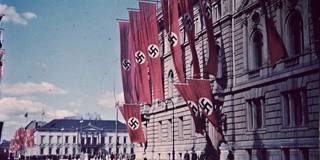In their rise to power, the Nazis deployed sophisticated modern communications technologies, including radio and film, to win the battle of ideas – and thus to shape public opinion and behavior – among a well-educated population in a fledgling democracy. Unfortunately, the Nazis’ horrific example remains all too relevant.
PARIS – In 1930s Germany, Nazi Party leaders understood the power of mass communication to disseminate hatred and anti-Semitism. “Propaganda,” Hitler wrote, “is a truly terrible weapon in the hands of an expert.” In their rise to power, the Nazis deployed sophisticated modern communications technologies, including radio and film, to win the battle of ideas – and thus to shape public opinion and behavior – among a well-educated population in a fledgling democracy.
The Nazis are gone but propaganda lives on, and its potential is deadlier than ever. As we commemorate the 71st anniversary of the liberation of Auschwitz-Birkenau on January 27, extremist groups around the globe wield new technologies to incite hatred and perpetrate new mass killings and genocides. That’s why UNESCO has decided to base this year’s International Day of Commemoration on the theme From Words to Genocide: Anti-Semitic Propaganda and the Holocaust. On this occasion, UNESCO and the United States Holocaust Memorial Museum (USHMM) are joining forces to present at UNESCO headquarters the exhibit State of Deception: The Power of Nazi Propaganda.
During the early 1930s, a period of severe economic distress, many Germans were willing to overlook the Nazis’ anti-Semitism, because they were attracted to other aspects of the party’s message. The Nazis knew this: In the run-up to the 1932 election, the party relied on the emerging field of public opinion research to probe the needs, hopes, and fears of blue- and white-collar workers, the middle class, women, farmers, and youth. Accordingly, Nazi propagandists toned down anti-Semitic rhetoric and presented the party as the only political force capable of creating jobs and putting food on German tables. Likewise, they won over newly enfranchised women voters by portraying themselves as the defender of traditional German womanhood and the family.

PARIS – In 1930s Germany, Nazi Party leaders understood the power of mass communication to disseminate hatred and anti-Semitism. “Propaganda,” Hitler wrote, “is a truly terrible weapon in the hands of an expert.” In their rise to power, the Nazis deployed sophisticated modern communications technologies, including radio and film, to win the battle of ideas – and thus to shape public opinion and behavior – among a well-educated population in a fledgling democracy.
The Nazis are gone but propaganda lives on, and its potential is deadlier than ever. As we commemorate the 71st anniversary of the liberation of Auschwitz-Birkenau on January 27, extremist groups around the globe wield new technologies to incite hatred and perpetrate new mass killings and genocides. That’s why UNESCO has decided to base this year’s International Day of Commemoration on the theme From Words to Genocide: Anti-Semitic Propaganda and the Holocaust. On this occasion, UNESCO and the United States Holocaust Memorial Museum (USHMM) are joining forces to present at UNESCO headquarters the exhibit State of Deception: The Power of Nazi Propaganda.
During the early 1930s, a period of severe economic distress, many Germans were willing to overlook the Nazis’ anti-Semitism, because they were attracted to other aspects of the party’s message. The Nazis knew this: In the run-up to the 1932 election, the party relied on the emerging field of public opinion research to probe the needs, hopes, and fears of blue- and white-collar workers, the middle class, women, farmers, and youth. Accordingly, Nazi propagandists toned down anti-Semitic rhetoric and presented the party as the only political force capable of creating jobs and putting food on German tables. Likewise, they won over newly enfranchised women voters by portraying themselves as the defender of traditional German womanhood and the family.